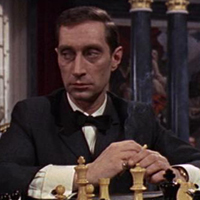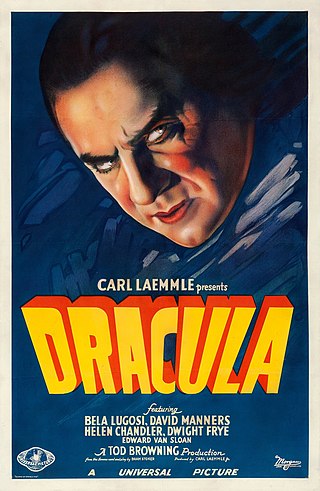Related Research Articles

Horror is a genre of fiction that is intended to disturb, frighten or scare. Horror is often divided into the sub-genres of psychological horror and supernatural horror, which are in the realm of speculative fiction. Literary historian J. A. Cuddon, in 1984, defined the horror story as "a piece of fiction in prose of variable length ... which shocks, or even frightens the reader, or perhaps induces a feeling of repulsion or loathing". Horror intends to create an eerie and frightening atmosphere for the reader. Often the central menace of a work of horror fiction can be interpreted as a metaphor for larger fears of a society.
Hammer Film Productions Ltd. is a British film production company based in London. Founded in 1934, the company is best known for a series of Gothic horror and fantasy films made from the mid-1950s until the 1970s. Many of these involve classic horror characters such as Baron Victor Frankenstein, Count Dracula, and the Mummy, which Hammer reintroduced to audiences by filming them in vivid colour for the first time. Hammer also produced science fiction, thrillers, film noir and comedies, as well as, in later years, television series.
Amicus Productions was a British film production company, based at Shepperton Studios, England, active between 1962 and 1977. It was founded by American producers and screenwriters Milton Subotsky and Max Rosenberg.

The Haunting is a 1963 horror film directed and produced by Robert Wise, adapted by Nelson Gidding from Shirley Jackson's 1959 novel The Haunting of Hill House. It stars Julie Harris, Claire Bloom, Richard Johnson, and Russ Tamblyn. The film depicts the experiences of a small group of people invited by a paranormal investigator to investigate a purportedly haunted house.

Dracula is a 1931 American pre-Code supernatural horror film directed and co-produced by Tod Browning from a screenplay written by Garrett Fort and starring Bela Lugosi in the title role. It is based on the 1924 stage play Dracula by Hamilton Deane and John L. Balderston, which in turn is adapted from the 1897 novel Dracula by Bram Stoker. Lugosi portrays Count Dracula, a vampire who emigrates from Transylvania to England and preys upon the blood of living victims, including a young man's fiancée.

Terence Fisher was a British film director best known for his work for Hammer Films.

The Innocents is a 1961 gothic psychological horror film directed and produced by Jack Clayton, and starring Deborah Kerr, Michael Redgrave, and Megs Jenkins. Based on the 1898 novella The Turn of the Screw by the American novelist Henry James, the screenplay was adapted by William Archibald and Truman Capote, who used Archibald's own 1950 stage play—also titled The Innocents—as a primary source text. Its plot follows a governess who watches over two children and comes to fear that their large estate is haunted by ghosts and that the children are being possessed.

Barbara Shelley was an English film and television actress. She appeared in more than a hundred films and television series. She was particularly known for her work in horror films, notably Village of the Damned; Dracula, Prince of Darkness; Rasputin, the Mad Monk and Quatermass and the Pit.

Weird West is a term used for the hybrid genres of fantasy Western, horror Western and science fiction Western. The term originated with DC's Weird Western Tales in 1972, but the idea is older as the genres have been blended since the 1930s, possibly earlier, in B-movie Westerns, comic books, movie serials and pulp magazines. Individually, the hybrid genres combine elements of the Western genre with those of fantasy, horror and science fiction respectively.

Vladek Sheybal was a Polish character actor, singer and director of both television and stage productions. He was well known for his portrayal of the chess grandmaster Kronsteen in the James Bond film From Russia with Love (1963), a role for which he had been personally recommended by his friend Sean Connery, and as Otto Leipzig in Smiley's People (1982). He also had notable recurring roles as Dr. Douglas Jackson in Gerry Anderson's UFO, Captain Ferreira in the NBC miniseries Shōgun and as Gen. Bratchenko in the 1984 version of Red Dawn.
The Dracula Society is a London-based literature and travel group with an interest in supernatural and macabre works of fiction, as exemplified by Bram Stoker's Dracula.
The character of Count Dracula from the 1897 novel Dracula by Bram Stoker, has remained popular over the years, and many forms of media have adopted the character in various forms. In their book Dracula in Visual Media, authors John Edgar Browning and Caroline Joan S. Picart declared that no other horror character or vampire has been emulated more times than Count Dracula. Most variations of Dracula across film, comics, television and documentaries predominantly explore the character of Dracula as he was first portrayed in film, with only a few adapting Stoker's original narrative more closely. These including borrowing the look of Count Dracula in both the Universal's series of Dracula and Hammer's series of Dracula, including the character's clothing, mannerisms, physical features, hair style and his motivations such as wanting to be in a home away from Europe.

Supernatural horror film is a film genre that combines aspects of supernatural film and horror film. Supernatural occurrences in such films often include ghosts and demons, and many supernatural horror films have elements of religion. Common themes in the genre are the afterlife, the Devil, and demonic possession. Not all supernatural horror films focus on religion, and they can have "more vivid and gruesome violence".

"Whistle and I'll Come to You" is a supernatural short television film which aired as an episode of the British documentary series Omnibus. Written and directed by Jonathan Miller, it is based on the ghost story "'Oh, Whistle, and I'll Come to You, My Lad'" by M. R. James, first published in the collection Ghost Stories of an Antiquary (1904), and first aired on BBC1 on 7 May 1968.

A Ghost Story for Christmas is a British supernatural anthology television series created by Lawrence Gordon Clark. Episodes take the form of short television films which air around Christmas, initially running annually on BBC1 from 1971–1978, with revivals airing sporadically between 2005–2013 and regularly since 2018.

Full Circle, released in the United States as The Haunting of Julia, is a 1977 supernatural horror film directed by Richard Loncraine, and starring Mia Farrow and Keir Dullea. Based on the novel Julia by the American writer Peter Straub, it is the first film realization of one of his books, and follows a woman who, after the death of her daughter, finds herself haunted by the vengeful ghost of a young girl in her new home.

A Gothic film is a film that is based on Gothic fiction or contains Gothic elements. Since various definite film genres—including science fiction, film noir, thriller, and comedy—have used Gothic elements, the Gothic film is challenging to define clearly as a genre. Gothic elements have also infused the horror film genre, contributing supernatural and nightmarish elements. To create a Gothic atmosphere, filmmakers have sought to create new camera tricks that challenge audiences' perceptions. Gothic films also reflected contemporary issues. A New Companion to The Gothic's Heidi Kaye said "strong visuals, a focus on sexuality and an emphasis on audience response" characterize Gothic films like they did the literary works. The Encyclopedia of the Gothic said the foundation of Gothic film was the combination of Gothic literature, stage melodrama, and German expressionism.
Folk horror is a subgenre of horror film and horror fiction that uses elements of folklore to invoke fear and foreboding. Typical elements include a rural setting, isolation, and themes of superstition, folk religion, paganism, sacrifice and the dark aspects of nature. Although related to supernatural horror film, folk horror usually focuses on the beliefs and actions of people rather than the supernatural, and often deals with naïve outsiders coming up against these. The British films Blood on Satan's Claw (1971), The Wicker Man (1973) and Witchfinder General (1968) are regarded as pioneers of the genre, while The Witch (2015) and Midsommar (2019) sparked renewed interest in folk horror. Southeast Asian cinema also commonly features folk horror.

The history of horror films was described by author Siegbert Solomon Prawer as difficult to read as a linear historical path, with the genre changing throughout the decades, based on the state of cinema, audience tastes and contemporary world events.
References
- 1 2 Eastaugh, Kenneth (18 June 1977). "Weekend Broadcasting: Previews". The Times . London. p. 10.
- ↑ "The Hamilton Deane Award: 1977". Dracula Society. 2013. Retrieved 24 October 2013.
- ↑ "BFI unveils Gothic: The Dark Heart of Film". British Film Institute. 27 June 2013. Retrieved 22 October 2013.
- ↑ "BFI DVD/Blu-ray releases announced for autumn 2013". British Film Institute. 29 July 2013. Retrieved 22 October 2013.
- ↑ Muller, Robert, ed. (1 June 1977). Supernatural: Haunting Stories of Gothic Terror. London: Fontana Books. ISBN 9780006150237.